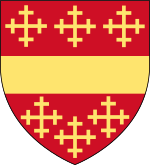|
Thomas Beauchamp, 11th Earl of Warwick
Thomas de Beauchamp, 11th Earl of Warwick, KG (c. 14 February 1313 – 13 November 1369), sometimes styled as Lord Warwick, was an English nobleman and military commander during the Hundred Years' War. His reputation as a military leader was so formidable that he was nicknamed "the devil Warwick" by the French. In 1348 he became one of the founders and the third Knight of the Order of the Garter. Thomas was undoubtedly a brave warrior in battle and proved to be a strong military leader. For example, the 14th century Anonimalle Chronicle states that when news arrived of his landing at Calais, the Duke of Burgundy, whose forces were camped nearby, made a hasty retreat under cover of darkness to avoid an encounter with 'the devil Warwick'. He fought in Scotland as captain of the army against the Scots in 1337 at the age of 24. He also fought in the Hundred Years Wars with France, commanding the English victory at the Battle of Crécy in 1346. Early life Thomas de Beauchamp was born at Warwick Castle, Warwickshire, England to Guy de Beauchamp, 10th Earl of Warwick and Alice de Toeni. He served in Scotland frequently during the 1330s, being captain of the army against the Scots in 1337. He was hereditary High Sheriff of Worcestershire from 1333 until his death (in 1369). In 1344, he was also made High Sheriff of Warwickshire and Leicestershire for life. [1] Victor at Crécy and PoitiersLeft:Seal (obverse) of Thomas de Beauchamp, 11th Earl of Warwick, dated 1344: S(IGILLUM) THO(M)E COMITIS WARRWYCHIE ANNO REGNI REGIS E(DWARDII) TE(RT)II...(continued on counter-seal) ("Seal of Thomas, Count (Earl) of Warwick in the year of the reign of King Edward the Third..."). He displays on his surcoat, shield and horse's caparison the arms of Beauchamp, and carries on his helm as crest a swan's head and neck; right: Counter-seal/reverse: (legend continued from face of seal) ...POST CO(N)QUESTU(M) ANGLIE SEPTI(M)O DECIM(0) ET REGNI SUI FRANCIE QUARTO ("...after the Conquest of England the seventeenth and of his reign of the Kingdom of France the fourth"). This dates the seal to 1344. The arms are those of de Newburgh, the family of the Beaumont Earls of Warwick: Checky azure and or, a chevron ermine. This same display of double arms was used on the seal of his father Guy de Beauchamp, 10th Earl of Warwick on his seal affixed to the Barons' Letter, 1301 Warwick was Marshal of England from 1343/4 until 1369, and was one of the commanders at the great English victories at Crécy and Poitiers, as well as the Siege of Calais (1346). Thomas de Beauchamp fought in all the French wars of King Edward III; he commanded the centre at the Battle of Crecy (where many of his relatives were killed, including his younger half-brother Alan la Zouche de Mortimer). He was trusted to be guardian of the sixteen-year-old Black Prince. He began the rebuilding of the Collegiate Church of Saint Mary in Warwick, supposedly using money received from the ransom of the archbishop of Sens, whom he captured at Poitiers, but that is an oversimplification.[1] Marriage and childrenLeft: Arms of Beauchamp: Gules, a fesse between six crosses crosslet or; right: arms of Newburgh Earls of Warwick: Checky azure and or a chevron ermine He married Katherine Mortimer, daughter of Roger Mortimer, 1st Earl of March. They had six sons and ten daughters:[2]
Catherine Grandison, Countess of Salisbury was not his daughter, although she is presented as such in William Painter's Palace of Pleasure and in the Elizabethan play Edward III, which may be by William Shakespeare. DeathBeauchamp's wife Katherine died on 4 August 1369. Beauchamp died three months later at Calais aged 56, on 13 November 1369,[3] of the Black Death and was buried alongside his wife in the chancel of St. Mary's Church, Warwick, Warwickshire.[1][4] Ancestry
Images Left: Thomas de Beauchamp, 11th Earl of Warwick & Katherine Mortimer effigies in Warwick St. Mary's church; right: Drawing of effigies of Thomas de Beauchamp, 11th Earl of Warwick & Katherine Mortimer in Warwick St. Mary's church References
Sources
|
|||||||||||||||||||||||||||||||||||||||||||||||||||||||||||||||||||||||||||||||||||||||||||||||||||||||||||||||||||||||||||||||||||||||||||||||||||||||||||||||||||||||||||||||||||||||||||||||||||||||||||||||||||||||||||||||||||||||||||||||||||||||||||||||||||||||||||||||||||||||||||||||||||||||||||






